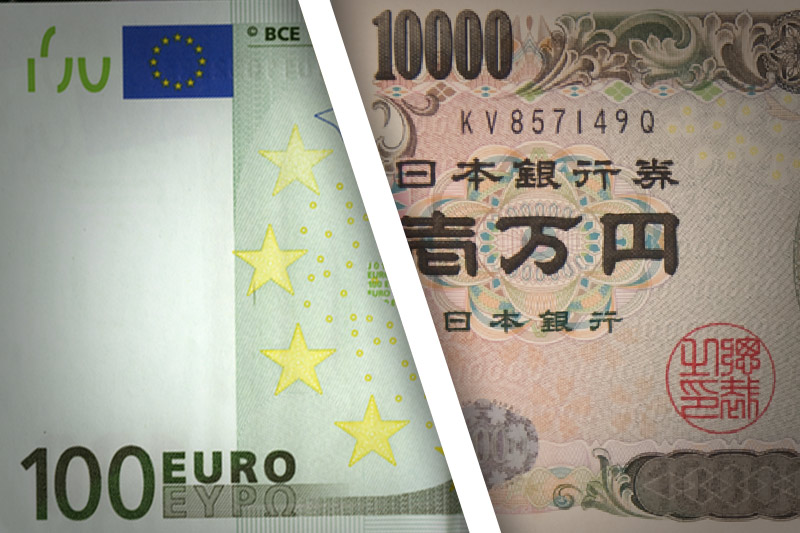Investing.com - The euro rose against the yen on Tuesday despite spotty data out of Europe that weakened the single currency against the greenback.
The yen came under pressure after a meeting of Group of Seven finance ministers and central bankers wrapped up recently with no mention of concern for Japan's loose monetary policies.
In U.S. trading on Tuesday, EUR/JPY was up 0.16% at 132.33, up from a low of 131.34 and off a high of 132.77.
The pair sought to test support at 131.54, the earlier low, and resistance at 132.77, the earlier high.
In Europe earlier, the ZEW index of German economic sentiment rose to 36.4 in May from 36.3 in April, well below expectations for a reading of 38.3, which put pressure on the single currency.
The index of current conditions fell to 8.9 from 9.2 in April, which markets interpreted as a sign that the German economy could face headwinds in its quest to rebound from a 0.5% contraction in the fourth quarter.
Inflation in Germany, meanwhile, did not surprise.
The country's consumer price index contracted 0.5 % in April from March and rose 1.2% from April of last year, both figures in line with expectations.
Elsewhere, Eurostat, the European Union's statistics office, reported that industrial production in the euro area rose by 1% in March from February, more than double expectations for a 0.4% increase.
Also supporting the euro, Spain saw borrowing costs fall to the lowest level since 2010 at an auction of 12-month government bonds.
Conflicting data out of the U.S. weakened the euro against the safe-haven dollar, though the yen, itself a safe harbor amid times of uncertainty, came under pressures of its own.
The yen recently dipped to lows not seen since October 2008 after economic policymakers from the Group of Seven industrialized economies concluded a meeting by refraining from criticizing Japan over policies which have resulted in a weaker yen.
The Bank of Japan has rolled out massive stimulus measures in recent months to steer the country away from deflationary decline, which have weakened the yen.
Still, wealthy G7 nations concluded at a U.K. summit over the weekend that such policies are designed to spur growth in Japan and are not out to give the Asian economy unfair advantages in global trade arenas.
The euro, meanwhile, was up against the pound and down against the U.S. dollar, with EUR/GBP trading up 0.21% at 0.8500 and EUR/USD trading down 0.27% at 1.2940.
On Wednesday, Japan is to release official data on tertiary industry activity.
The eurozone is to release preliminary data on first-quarter gross domestic product and the leading measure of the economy’s health. Germany, France and Italy are to release individual data on first-quarter growth.
The yen came under pressure after a meeting of Group of Seven finance ministers and central bankers wrapped up recently with no mention of concern for Japan's loose monetary policies.
In U.S. trading on Tuesday, EUR/JPY was up 0.16% at 132.33, up from a low of 131.34 and off a high of 132.77.
The pair sought to test support at 131.54, the earlier low, and resistance at 132.77, the earlier high.
In Europe earlier, the ZEW index of German economic sentiment rose to 36.4 in May from 36.3 in April, well below expectations for a reading of 38.3, which put pressure on the single currency.
The index of current conditions fell to 8.9 from 9.2 in April, which markets interpreted as a sign that the German economy could face headwinds in its quest to rebound from a 0.5% contraction in the fourth quarter.
Inflation in Germany, meanwhile, did not surprise.
The country's consumer price index contracted 0.5 % in April from March and rose 1.2% from April of last year, both figures in line with expectations.
Elsewhere, Eurostat, the European Union's statistics office, reported that industrial production in the euro area rose by 1% in March from February, more than double expectations for a 0.4% increase.
Also supporting the euro, Spain saw borrowing costs fall to the lowest level since 2010 at an auction of 12-month government bonds.
Conflicting data out of the U.S. weakened the euro against the safe-haven dollar, though the yen, itself a safe harbor amid times of uncertainty, came under pressures of its own.
The yen recently dipped to lows not seen since October 2008 after economic policymakers from the Group of Seven industrialized economies concluded a meeting by refraining from criticizing Japan over policies which have resulted in a weaker yen.
The Bank of Japan has rolled out massive stimulus measures in recent months to steer the country away from deflationary decline, which have weakened the yen.
Still, wealthy G7 nations concluded at a U.K. summit over the weekend that such policies are designed to spur growth in Japan and are not out to give the Asian economy unfair advantages in global trade arenas.
The euro, meanwhile, was up against the pound and down against the U.S. dollar, with EUR/GBP trading up 0.21% at 0.8500 and EUR/USD trading down 0.27% at 1.2940.
On Wednesday, Japan is to release official data on tertiary industry activity.
The eurozone is to release preliminary data on first-quarter gross domestic product and the leading measure of the economy’s health. Germany, France and Italy are to release individual data on first-quarter growth.
